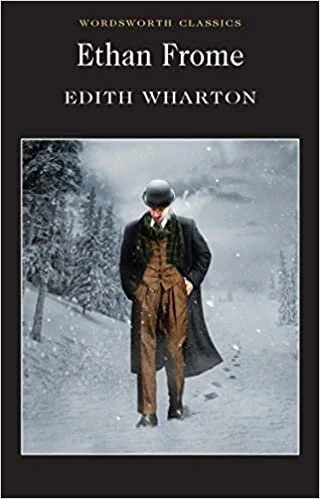Amended! This post has been amended in the light of further discussion or cogitations.
A literature course called Great Novellas beckoned me. I enrolled on it in order to discover writers or works I had not encountered before, and to sample fine writing I might learn from in order to improve my craft. This was one of the books on that course.
Brrrr. I could feel the cold seeping into my bones as I read this book. It wasn’t just the cold of the New England winter, but the sense of a lack of life, a lack of vibrancy in the eponymous character and his household.
The pages in my copy are marked (in pencil of course) all the way through, to highlight wonderfully-crafted sentences. Such as:
“One would have supposed that such an atmosphere must quicken the emotions as well as the blood: but it seemed to produce no change except that of retarding still more the sluggish pulse of Starkfield.”
And this:
“He saw Eady, after a moment, jump from the cutter and go toward the girl with the reins over one arm. The other he tried to slip through hers; but she eluded him nimbly, and Frome’s heart, which had swung out over a black void, trembled back to safety. ”
This sentence made me smile, because it reminded me of a blues song. Compare and contrast:
“Sickness and trouble: that’s what Ethan’s had his plate full up with, ever since the first helping.”
“Hard luck and trouble is my only friend
I been on my own ever since I was ten
Born under a bad sign
Been down since I began to crawl
If it wasn’t for bad luck, I wouldn’t have no luck at all”
Interestingly, I find these two extracts similar in structure, but not in the effect they have on me. From a structural point of view, there is a nice balance which is similar in both cases:
sickness and trouble…
hard luck and trouble…
But the first generates a feeling of, not so much depression, but the atmosphere of a dreary, damp, Sunday evening in November, while the second just makes me laugh. (Not because of schadenfreude, but because of the poor grammar and exaggerated circumstances depicted in blues songs like this.)
I wasn’t sure about the framing device, which involved starting and ending with an objective narrator in the present, and in the middle telling the story as it happened 25 years ago, pieced together from clues the nameless narrator discovered or pieced together with the stories he’d heard when he stayed the night at Frome’s place. Although, as the introduction to this edition points out, it was a clever way of allowing the author to have two separate viewpoints.
The story isn’t dramatic in the same way as, say, Giovanni’s Room is, but it gripped me just the same. A very enjoyable read.
Thanks to Deborah Norton for questioning a couple of assumptions I’d (almost certainly incorrectly) made about the narrator’s gender and how he arrived at the truth of Frome’s story.
If you found this article interesting, why not subscribe to my newsletter, Terry Freedman’s Books Bulletin?
